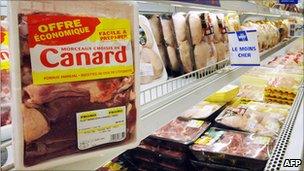EU targets meat origins with new food labelling
- Published
- comments
People in Poland, Germany and the UK give their opinions on food labelling
European consumers will have to be told where most of their meat comes from under new EU food labelling rules set to become law soon.
Euro-MPs backed the wide-ranging rules in a vote on Wednesday.
Beef currently has country-of-origin labelling, but the plan is to extend that to poultry, pork and lamb too.
A standard label including information about energy content, fats, sugar and salt is set to become mandatory for pre-packed food sold across the EU.
In recent weeks food safety has been a hot topic in Europe because of an E. coli outbreak that has claimed 49 lives in Germany.
Bean sprouts from an organic farm in Lower Saxony were blamed, but the origin is now believed to be contaminated fenugreek seeds imported from Egypt.

Health concerns have fuelled Europe's drive for better food labelling
The crisis highlighted the complexity of Europe's food chain and the need for traceability.
The new labelling rules were under discussion long before the German emergency, however.
The nutritional data will have to be grouped in tabular form on the packaging and expressed per 100g or per 100ml.
Food producers can also include Guideline Daily Amounts (GDAs) - a system already widely used - or use the term "per portion", once the European Commission has defined portion sizes.
A minimum font size of 1.2mm has been set for the lettering - or 0.9mm for small packets - so that the labels are clear.
The legislation, external allows food businesses a maximum of five years to switch to the new labels.
Country of origin debate
There is scope for businesses to provide more information than the mandatory minimum - for example, the "traffic light" colour-coding scheme used by many UK retailers can continue.
Under the new rules, any allergenic substances will have to be clearly labelled in the ingredients.
Besides beef, currently the country of origin has to be marked on packs of fresh fruit and vegetables, fish, olive oil and honey.
MEPs also wanted the country of origin to be marked on dairy produce and on processed meat such as sausages and ready meals, but EU ministers rejected that proposal.
The European Commission will study the feasibility of widening country of origin labelling to other foods.
The European Parliament's chief negotiator on the new rules, German centre-right MEP Renate Sommer, warned of the extra cost to businesses.
"First we must establish whether the country of origin indication is really viable for strawberries in jam or for tomatoes in ketchup, and what extra costs are involved, because it's ultimately the consumer who pays," she said.
Administrative burden
Imitation foods, for example cheese substitute based on vegetable oil, will have to be accurately labelled on the front of the pack so as not to mislead shoppers.
If palm oil is used as a vegetable oil then it will have to be stated on the label. That is meant to satisfy consumers who may be concerned about palm oil plantations, which have replaced areas of rainforest in some developing countries.
The main European consumers' organisation, BEUC, welcomed the changes, but voiced dismay that the nutrition information would not have to be put on the front of the pack.
BEUC director general Monique Goyens said "consumers will be able to make more informed choices on food products, but the regulation will not enable them to choose the healthiest products at a glance".
"With regard to the traffic light scheme which presents the amount of nutrients in a food product, we consider its rejection last year a real blow for consumers," she added.
The main exemptions from the mandatory labelling system will be for small-scale traditional producers and for fresh produce that is not pre-packed.
EU negotiators decided that small-scale producers should not face the additional administrative cost of adopting the new labels.
An animal welfare activist told the Farming Today programme on BBC Radio 4 that there was still time to make the new EU rules more detailed, so that labels "show where animals were born, reared and slaughtered".
Peter Stevenson of Compassion in World Farming said consumers had a right to know the animal's life journey, and "to be in a position to say 'No, we won't buy that meat'". Consumers already get such information for veal, he said.
According to Andrew Opie of the British Retail Consortium, UK meat producers already show on the pack where an animal was born and reared. He said it should not be mandatory to indicate the place of slaughter.
Meat from animals slaughtered by means other than stunning - for example kosher or halal meat - will not have to be labelled as such. But MEPs will consider the issue again in a review of the EU's animal welfare strategy.
- Published8 December 2010
- Published4 August 2010
- Published13 July 2010